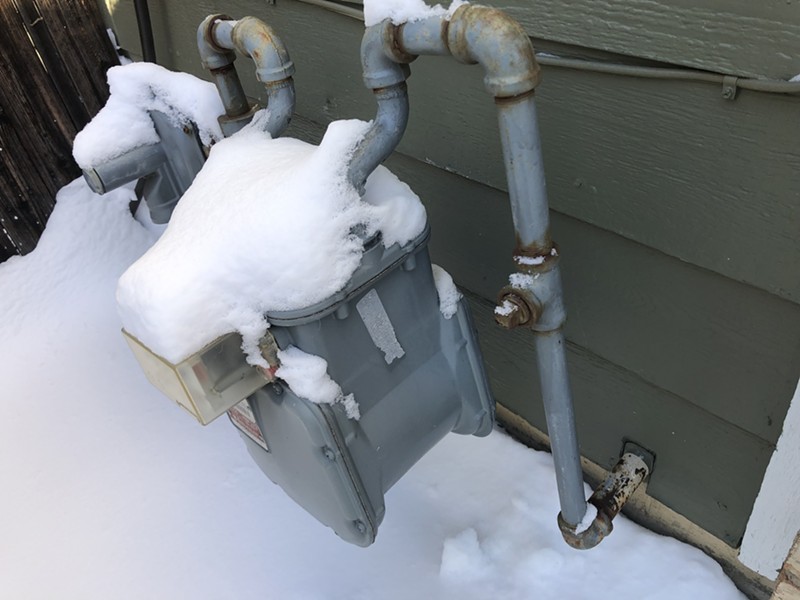It couldn’t just be the cold: The highest therm usage she’d had in all of 2021 was just over 100.
“I called them, and I said, ‘Well, it doesn't seem right,'” she says. “‘There's something wrong here.’ And they kind of were brushing me off.”
Crutcher says when she asked the Xcel representative on the phone if there could be a gas leak, the representative told her there probably wasn’t one, but when the representative went on to say the company hadn’t serviced her meter since 2019, she got worried.
“I was like, wow, they haven't really serviced my meter,” she remembers thinking. “That's dangerous, isn't it?”
When she went to check her meter, she smelled gas and immediately called in an emergency technician, who confirmed her suspicions. She says her meter was in disrepair, with rusted pipes as well as the leak.
Xcel says it conducts surveys of its natural gas system every three years to find and repair leaks, which can include meter inspection. Federal law stipulates system-wide surveys every five years.
"We’re looking at new, cost-effective technologies and strategies to further improve the frequency of our monitoring," Tyler Bryant, a media relations representative with Xcel, shared.
Improved frequency could have helped Crutcher. As a result of the leak, her December bill was $418. Crutcher usually budgets between $150 and $200 a month for utilities at her Westminster home. She’s a horticulture student at Front Range Community College and says an increase that drastic means she’s had to consider dropping one of her classes.
Crutcher is trying to get Xcel to lower her bill because there was a leak, but she’s been told that because the leaking pipe is the one that runs into her house, it’s her responsibility. She was never informed that she needed to examine the meter herself or check for gas leaks, assuming Xcel would notice problems and inform her if she had to take action.
"If we find a leak on a customer’s piping, the customer is immediately notified so they can have repairs made," Bryant says. "Customers are responsible for the maintenance of gas piping from the gas meter to all buried gas piping and gas appliances, as well as paying for any gas used on their side of the meter."
That came as a shock to Crutcher, and she doubts she's alone.
“I don't know that most homeowners are really aware of that,” Crutcher says. “I'm sure there's some small print somewhere, but there's not really information out there. … They have a charge on the bill to maintain the meters, so that's my question: If we're paying for it, then why isn't it happening?”
Crutcher reached out to the Colorado Public Utilities Commission, because the situation seemed unfair. She says the Xcel repair was originally going to simply scrape the pipes and repaint them, but once she complained, the company replaced the whole meter — but not the pipe on the side that goes into her house.
Cutcher says her case with the PUC, which she opened December 23, might have helped get the meter replaced, but she isn’t sure, because the commission hasn’t been very responsive to her emails.
After she asked the commission if it could help her get Xcel to lower her bill, a member of the PUC's consumer affairs team told her they are working with Xcel to get information and resolve both the broken meter and the bill. That message came on January 23. In the meantime, Crutcher’s $418 bill was due January 22, though she's holding off on paying until her case is resolved.
Crutcher doesn’t think the PUC is doing enough to protect customers. “It doesn't seem like they're holding them accountable,” she says.
But while her high bill is extreme, she’s not alone in being shocked by the totals on recent bills. Westword readers' bills went up an average of $140 in the November and December billing periods.
And though many, like Crutcher, don’t think the PUC is protecting them, the commission acknowledges that people are struggling, to the point of hosting a session on utility affordability during the commissioners’ weekly meeting on January 25.
“I can't remember seeing this level of pain in the consumer community since the 1970s in the gas crisis,” Commissioner John Gavan said. “I take this very seriously, and I'm glad that we're having a session to really help surface the issues and explain what we know at this point.”
Erin O’Neill, chief economist with the PUC, noted that the consumer affairs team has received an extremely high number of calls and complaints, with customer care requests like Crutcher’s more than doubling in the past year.
Overall, electric bills have increased by about 25 percent year over year, and gas bills have increased 75 percent.
“Why the impact on the electric side is so small is because wind and solar resources are not sensitive to those price increases in the volatility in the gas market,” O’Neill said. "Those resources are insulated from the volatility of fossil fuels, and to the extent that we have implemented and developed wind and solar resources in the state, that's being a hedge against that for all our electric customers.”
Although customers are paying for those adjustments to the grid, those increases are represented in the more stable base rate customers pay and don’t swing from month to month like the commodity price of natural gas, which utilities pass down to customers.

Temperatures are dropping, and residents are trying to figure out ways to stay warm without incurring more costs.
Getty Images
The rise in price, plus the cold temperatures this year, are part of what has caused bills to be so high, O’Neill said. Unfortunately, the PUC, like Xcel, doesn’t have much control over those costs, as they’re determined by the national and international market.
“There are certain tools that utilities implement, like storage and hedging contracts, to try to work around the margins on sort of having a mix of different supply options,” O’Neill continued. "There's a limit to that, because you do need to be able to balance the daily demand for gas, and you're going to have to purchase on a daily basis because it's not cold every day.”
However, the PUC does approve the fuel rate customers are charged to make sure that utilities are doing their due diligence when it comes to purchasing natural gas, and the commission recently approved new rules that establish performance incentives for gas purchasing.
The PUC has the most control over the base rates, which don't swing with commodity cost, O’Neill said. Those base rates have gotten higher in recent years because of increased pipeline safety requirements and more economic growth in Colorado; both have caused utilities to recover the cost of infrastructure updates from customers.
“The intuition here is sort of from 2007 to 2008. Commodity costs have come down for fourteen years, and we've basically doubled base rates without it really being very apparent on the overall bill," said PUC Chairman Eric Blank. "And now it's the combination of higher commodity prices combined with a doubling of base rates that really just puts us in a different world, maybe, and creates much more affordability pressure."
Blank suggested that the commission could examine caps or deferrals on cost when there are swings to help spread the volatility out over time. He also said the commission should look into trying to align incentives better so that when customers are charged more, the utilities share some of that pain. In addition, Blank called for the commission to examine how better to support income-qualified customers financially.
Commissioner Megan Gilman had a few ideas, too, including examining the planning of gas systems and implementing alternatives to help lower the base rate that customers are charged.

Just weeks after the repair, rust is already seeping through the new coat of paint on Rhonnie Crutcher's meter.
Rhonnie Crutcher
“On the gas system, a significant portion of that investment is dedicated to revamping old equipment,” she says. “We have not seen a sign of this slowing currently, or in the future, based on the filings that we've seen, so the gas system in particular looks quite expensive to maintain.”
In the past, the commission has dealt with investments made by utilities retroactively, examining how much utilities should be allowed to recoup from customers after the money is spent. It’s currently working to look at those investments proactively instead, particularly as each utility will be required to file a Clean Heat Plan that will create a 4 percent reduction below 2015 greenhouse gas emission levels by 2025 and 22 percent below 2015 greenhouse gas emission levels by 2030.
Gilman says commissioners also need to take a look at realigning the incentive for utilities to purchase the cheapest gas.
“You have a fundamentally flawed economic transaction when one party to the transaction wants to make as much money as possible and the other party is agnostic,” she said. In this case, those selling the gas want to make money, and Xcel is agnostic because the cost is passed on to customers. “We need to ensure that they have some skin in the game.”
Gilman wants to see more attention paid to customer cost concerns by utilities going forward, and the commission collectively indicated that it will continue to work on those long-term solutions.
In the short term, though, you’ll be getting $17 in savings thanks to Xcel filing an interim fuel price adjustment with the PUC because natural gas prices went down nationwide. Additionally, the commissioners plan to schedule a public comment hearing in the next week to get more feedback from residents about their struggles.
"We share the commission’s concerns and appreciate their efforts to provide greater insight into the causes of higher costs," Bryant says.
To comment, people can refer to the PUC’s guide to public participation.
Despite Crutcher's interactions with the PUC, she hasn't felt heard yet.
“Whenever Xcel asks for increases, they approve it, and that's not representing average homeowners like me,” Crutcher says. “To have a bill double when we're already in an inflationary time, and for the Public Utilities Commission to keep approving all of these fee increases over and above what Xcel probably needs so that they can pay profits to their shareholders is outrageous. Because we don't have any place else to go.”











